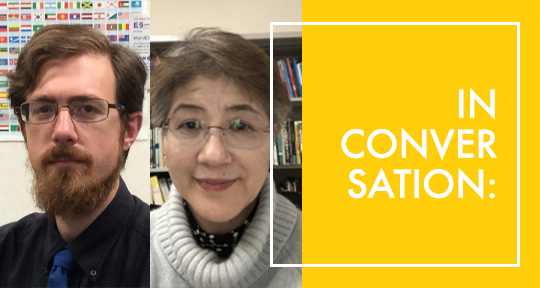In their work introducing the rich tradition of oral storytelling in the Tsugaru dialect, Joshua Lee Solomon and Megumi Tada of Hirosaki University are moving beyond traditional geographic and linguistic boundaries. Having translated the unique folklore of northeastern Japan from its local vernacular into English, they’ve also facilitated a workshop combining English language education and studies of the region. In the workshop, students learned to perform the tales under the guidance of master storytellers from the preservation society Wa no mukashi-ko, and eventually performed in English alongside the storytellers performing in dialect. We discussed, via Zoom, the interrelated areas of translation, cultural preservation, and language education. Listening to their retellings of favorite folktales, I experienced firsthand how the emotions of storytelling—nostalgia, laughter, heartache—transcend space and time.
Mary Hillis (MH): Could you give some background information about the local Japanese dialect in Tsugaru?
Joshua Lee Solomon (JS): There is a lingering perception that the Tsugaru dialect is used by uneducated or somehow uncivilized people, and this is connected to a long history of prejudice against the poorer regions in northeastern Japan. The Tsugaru region was historically isolated for a very long time by mountains and its relative distance from the political and economic centers of the country, so it’s a repository of very old Japanese words.
One of my favorite examples of this is the word in the Tsugaru dialect of “udade.” Depending on the age of the person you’re talking to, they might say this word only means something really bad or uncomfortable, whereas young people are more likely to use it meaning cool and good—the same way you use “yabai” in contemporary standard Japanese (like certain expletives in English used in either positive or negative connotations). But actually, I think this word comes from the Manyoshu, which is an ancient collection of poetry. In the text, there’s the word “utate” and that word is an intensifier—meaning “extreme” or “very much.” In this way, there are older Japanese words that are kept in the current language.

